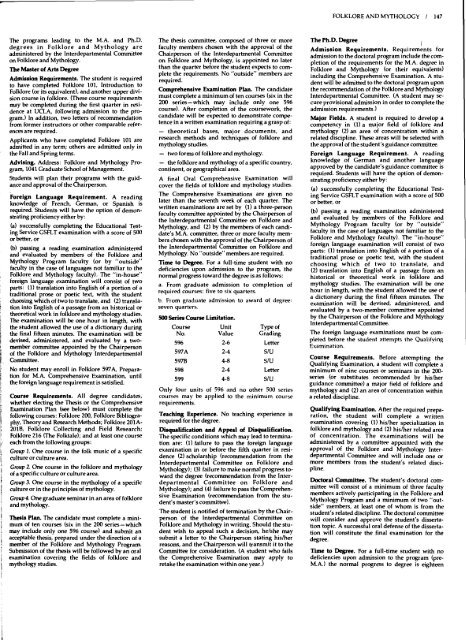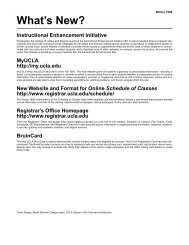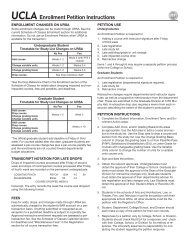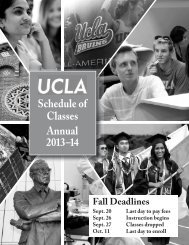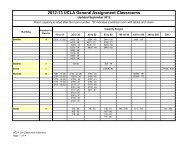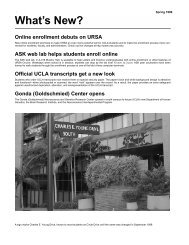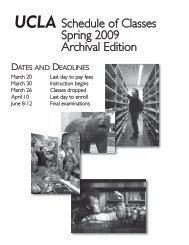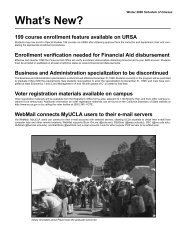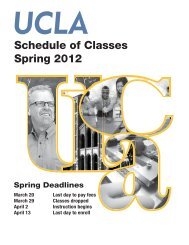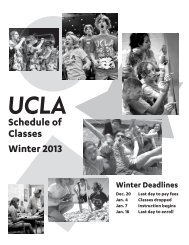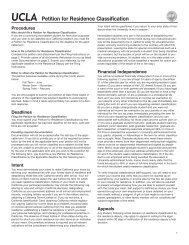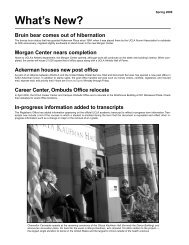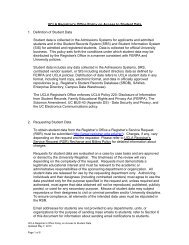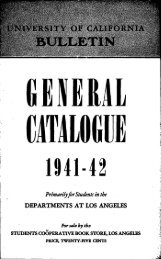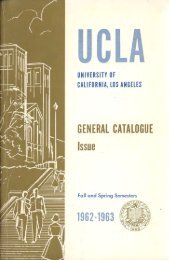UCLA Graduate Catalog 1980-81 - Registrar - UCLA
UCLA Graduate Catalog 1980-81 - Registrar - UCLA
UCLA Graduate Catalog 1980-81 - Registrar - UCLA
Create successful ePaper yourself
Turn your PDF publications into a flip-book with our unique Google optimized e-Paper software.
The programs leading to the M.A. and Ph.D.<br />
degrees in Folklore and Mythology are<br />
administered by the Interdepartmental Committee<br />
on Folklore and Mythology.<br />
The Master of Arts Degree<br />
Admission Requirements . The student is required<br />
to have completed Folklore 101, Introduction to<br />
Folklore (or its equivalent), and another upper division<br />
course in folklore. (These course requirements<br />
may be completed during the first quarter in residence<br />
at <strong>UCLA</strong>, following admission to the program.)<br />
In addition, two letters of recommendation<br />
from former instructors or other comparable references<br />
are required.<br />
Applicants who have completed Folklore 101 are<br />
admitted in any term; others are admitted only in<br />
the Fall and Spring terms.<br />
Advising . Address: Folklore and Mythology Program,<br />
1041 <strong>Graduate</strong> School of Management.<br />
Students will plan their programs with the guidance<br />
and approval of the Chairperson.<br />
Foreign Language Requirement . A reading<br />
knowledge of French, German, or Spanish is<br />
required. Students will have the option of demonstrating<br />
proficiency either by:<br />
(a) successfully completing the Educational Testing<br />
Service GSFLT examination with a score of 500<br />
or better, or<br />
(b) passing a reading examination administered<br />
and evaluated by members of the Folklore and<br />
Mythology Program faculty (or by "outside"<br />
faculty in the case of languages not familiar to the<br />
Folklore and Mythology faculty). The "in-house"<br />
foreign language examination will consist of two<br />
parts : (1) translation into English of a portion of a<br />
traditional prose or poetic text, with the student<br />
choosing which of two to translate, and (2) translation<br />
into English of a passage from an historical or<br />
theoretical work in folklore and mythology studies.<br />
The examination will be one hour in length, with<br />
the student allowed the use of a dictionary during<br />
the final fifteen minutes. The examination will be<br />
devised, administered, and evaluated by a twomember<br />
committee appointed by the Chairperson<br />
of the Folklore and Mythology Interdepartmental<br />
Committee.<br />
No student may enroll in Folklore 597A, Preparation<br />
for M.A. Comprehensive Examination, until<br />
the foreign language requirement is satisfied.<br />
Course Requirements . All degree candidates,<br />
whether electing the Thesis or the Comprehensive<br />
Examination Plan (see below) must complete the<br />
following courses: Folklore 200, Folklore Bibliography,<br />
Theory and Research Methods; Folklore 201A-<br />
201B, Folklore Collecting and Field Research;<br />
Folklore 216 (The Folktale); and at least one course<br />
each from the following groups:<br />
Group 1. One course in the folk music of a specific<br />
culture or culture area.<br />
Group 2. One course in the folklore and mythology<br />
of a specific culture or culture area.<br />
Group 3. One course in the mythology of a specific<br />
culture or in the principles of mythology.<br />
Group 4. One graduate seminar in an area of folklore<br />
and mythology.<br />
Thesis Plan. The candidate must complete a minimum<br />
of ten courses (six in the 200 series-which<br />
may include only one 596 course ) and submit an<br />
acceptable thesis, prepared under the direction of a<br />
member of the Folklore and Mythology Program.<br />
Submission of the thesis will be followed by an oral<br />
examination covering the fields of folklore and<br />
mythology studies.<br />
The thesis committee, composed of three or more<br />
faculty members chosen with the approval of the<br />
Chairperson of the Interdepartmental Committee<br />
on Folklore and Mythology, is appointed no later<br />
than the quarter before the student expects to complete<br />
the requirements.<br />
required.<br />
No "outside" members are<br />
Comprehensive Examination Plan . The candidate<br />
must complete a minimum of ten courses (six in the<br />
200 series-which may include only one 596<br />
course). After completion of the coursework, the<br />
candidate will be expected to demonstrate competence<br />
in a written examination requiring a grasp of:<br />
- theoretical bases, major documents, and<br />
research methods and techniques<br />
mythology studies.<br />
of folklore and<br />
- two forms of folklore and mythology.<br />
- the folklore and mythology of a specific country,<br />
continent, or geographical area.<br />
A final Oral Comprehensive Examination will<br />
cover the fields of folklore and mythology studies.<br />
The Comprehensive Examinations are given no<br />
later than the seventh week of each quarter. The<br />
written examinations are set by (1) a three-person<br />
faculty committee appointed by the Chairperson of<br />
the Interdepartmental Committee on Folklore and<br />
Mythology, and (2) by the members of each candidate's<br />
M.A. committee, three or more faculty members<br />
chosen with the approval of the Chairperson of<br />
the Interdepartmental Committee on Folklore and<br />
Mythology. No "outside" members are required.<br />
Time to Degree . For a full-time student with no<br />
deficiencies upon admission to the program, the<br />
normal progress toward the degree is as follows:<br />
a. From graduate admission to completion of<br />
required courses: five to six quarters.<br />
b. From graduate<br />
seven quarters.<br />
admission to award of degree:<br />
500 Series Course Limitation.<br />
Course Unit Type of<br />
No. Value Grading<br />
596 2-6 Letter<br />
597A 2-4 S/U<br />
5976 4-8 S/U<br />
598 2-4 Letter<br />
599 4-8 S/U<br />
Only four units of 596 and no other 500 series<br />
courses may be applied to the minimum course<br />
requirements.<br />
Teaching Experience . No teaching experience<br />
required for the degree.<br />
is<br />
Disqualification and Appeal of Disqualification.<br />
The specific conditions which may lead to termination<br />
are : (1) failure to pass the foreign language<br />
examination in or before the fifth quarter in residence<br />
(2) scholarship (recommendation from the<br />
Interdepartmental Committee on Folklore and<br />
Mythology); (3) failure to make normal progress toward<br />
the degree (recommendation from the Interdepartmental<br />
Committee on Folklore and<br />
Mythology); and (4) failure to pass the Comprehensive<br />
Examination (recommendation from the student'<br />
s master's committee).<br />
The student is notified of termination by the Chairperson<br />
of the Interdepartmental Committee on<br />
Folklore and Mythology in writing. Should the student<br />
wish to appeal such a decision, he/she may<br />
submit a letter to the Chairperson stating his/her<br />
reasons, and the Chairperson will transmit it to the<br />
Committee for consideration . (A student who fails<br />
the Comprehensive Examination ma apply to<br />
retake the examination within one year.)<br />
FOLKLORE AND MYTHOLOGY / 147<br />
The Ph. D. Degree<br />
Admission Requirements<br />
i<br />
. Requirements for<br />
admission to the doctoral program include the completion<br />
of the requirements for the M.A. degree in<br />
Folklore and Mythology (or their equivalents)<br />
including the Comprehensive Examination. A student<br />
will be admitted to the doctoral program upon<br />
the recommendation of the Folklore and Mythology<br />
Interdepartmental Committee. (A student may secure<br />
provisional admission in order to complete the<br />
admission requirements.)<br />
Major Fields. A student is required to develop a<br />
competency in (1) a major field of folklore and<br />
mythology (2) an area of concentration within a<br />
related discipline. These areas will be selected with<br />
the approval of the student's guidance committee.<br />
Foreign Language Requirement . A reading<br />
knowledge of German and another language<br />
approved by the candidate's guidance committee is<br />
required. Students will have the option of demonstrating<br />
proficiency either by:<br />
(a) successfully completing the Educational Testing<br />
Service GSFLT examination with a score of 500<br />
or better, or<br />
(b) passing a reading examination administered<br />
and evaluated by members of the Folklore and<br />
Mythology Program faculty (or by "outside"<br />
faculty in the case of languages not familiar to the<br />
Folklore and Mythology faculty). The "in-house"<br />
foreign language examination will consist of two<br />
parts: (1) translation into English of a portion of a<br />
traditional prose or poetic text, with the student<br />
choosing which of two to translate, and<br />
(2) translation into English of a passage from an<br />
historical or theoretical work in folklore and<br />
mythology studies. The examination will be one<br />
hour in length, with the student allowed the use of<br />
a dictionary during the final fifteen minutes. The<br />
examination will be devised, administered, and<br />
evaluated by a two-member committee appointed<br />
by the Chairperson of the Folklore and Mythology<br />
Interdepartmental Committee.<br />
The foreign language examinations must be completed<br />
before the student attempts the Qualifying<br />
Examination.<br />
Course Requirements . Before attempting the<br />
Qualifying Examination , a student will complete a<br />
minimum of nine courses or seminars in the 200series<br />
(or substitutes recommended by his/her<br />
guidance committee) a major field of folklore and<br />
mythology and (2) an area of concentration within<br />
a related discipline.<br />
Qualifying Examination . After the required preparation<br />
, the student will complete a written<br />
examination covering (1) his/her specialization in<br />
folklore and mythology and (2) his/her related area<br />
of concentration. The examinations will be<br />
administered by a committee appointed with the<br />
approval of the Folklore and Mythology Interdepartmental<br />
Committee and will include one or<br />
more members from the student's related discipline.<br />
Doctoral Committee . The student's doctoral committee<br />
will consist of a minimum of three faculty<br />
members actively participating in the Folklore and<br />
Mythology Program and a minimum of two "outside"<br />
members, at least one of whom is from the<br />
student 's related discipline. The doctoral committee<br />
will consider and approve the student's dissertation<br />
topic. A successful oral defense of the dissertation<br />
will constitute the final examination for the<br />
degree.<br />
Time to Degree. For a full-time student with no<br />
deficiencies upon admission to the program (pre-<br />
M.A.) the normal progress to degree is eighteen


